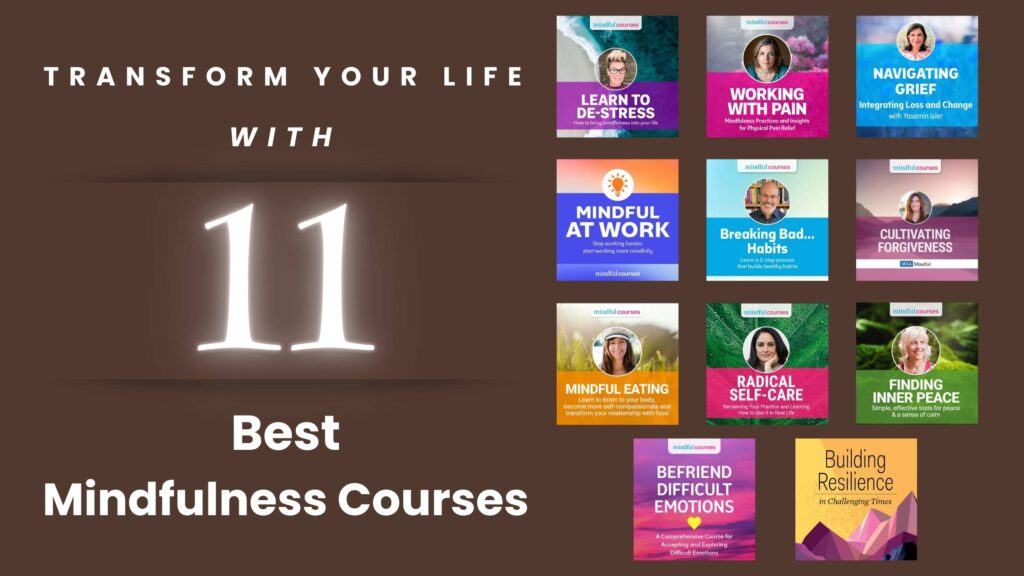Why meditation is so hard, even when it’s supposed to help us relax? You sit down, close your eyes, and try to focus, but your mind races, your body feels restless, or you start wondering if you’re doing it right. If this sounds familiar, you’re not alone. Many beginners struggle with meditation, and it’s easy to feel frustrated or even give up. But the truth is, these challenges are a normal part of the process.
In this post, we’ll explore seven common reasons why meditation feels so hard and, more importantly, how to overcome them. Whether it’s dealing with a restless mind, impatience, or discomfort, you’ll find practical solutions to make meditation easier and more enjoyable. Let’s dive in!
1. Restless Mind
It’s frustrating when you try to meditate, but your mind won’t slow down. Instead of peace, you get a flood of thoughts, memories, worries, to-do lists. It can feel like meditation is making your mind even busier. But this is completely normal.
Why This Happens
- Your brain is used to constant activity. All day, your mind jumps from one thing to another work, social media, conversations. When you sit down to meditate, it doesn’t just stop. Instead, you become more aware of how active it really is.
- Your thoughts seem louder in stillness. When you remove distractions, your thoughts have space to surface. This doesn’t mean you’re meditating wrong. It means you’re noticing what’s already there.
- You may feel the need to control your thoughts. Many people think meditation means “clearing the mind.” But trying to force thoughts away only makes them stronger.
How to Fix It
- Stop trying to silence your mind. Instead of fighting thoughts, treat them like background noise. Let them come and go, just like passing clouds.
- Use an anchor for focus. Bring your attention to your breath, a sound, or a physical sensation (like your hands resting on your lap). Each time your mind drifts, gently return to your anchor.
- Be patient with yourself. A busy mind doesn’t mean failure. It means you’re noticing, which is progress. Over time, your mind will settle more easily.
Remember, a restless mind isn’t a sign to stop meditating. It’s a sign that you’re doing the work. Stick with it, and over time, it will get easier.
2. Impatience
Meditation is meant to bring peace, but what if you don’t feel calm right away? Many people expect quick results and feel frustrated when nothing changes. It’s easy to think, “Why isn’t this working?” and give up too soon.
Why This Happens
- We are used to fast results. In daily life, we get instant feedback. If we send a message, we get a reply. If we watch TV, we feel entertained. But meditation works differently. It’s a slow, gradual process.
- We expect every session to feel peaceful. Some people think meditation should always bring deep calm. But the truth is, some sessions will feel restless or boring. That’s normal.
- We try too hard to relax. Ironically, forcing relaxation can make meditation harder. The more we chase peace, the more frustrated we become.
How to Fix It
- Let go of expectations. Meditation isn’t about feeling a certain way. It’s about showing up and practicing, no matter how the session feels.
- Start small. Instead of forcing long sessions, begin with just 2-5 minutes a day. Short, consistent practice is better than struggling through long sessions.
- Notice small improvements. Maybe you’re not instantly stress-free, but are you reacting less to small annoyances? Are you feeling more present in daily life? These are signs that meditation is working.
- Focus on the process, not the outcome. Instead of thinking, “Is this working?” try thinking, “I’m practicing, and that’s enough.” Progress will come with time.
Meditation is like planting a seed. You won’t see results right away, but with patience and care, growth will happen. Keep going!
3. Physical Discomfort
Sitting for meditation sounds simple, but it can quickly become uncomfortable. Your back aches, your legs go numb, or you feel the urge to move. Instead of relaxing, you’re focused on your discomfort. This can make meditation feel frustrating.
Why This Happens
- Your body isn’t used to stillness. We spend most of the day moving. Sitting still for a long time can feel unnatural or even stiff.
- Posture misconceptions. Many think they must sit cross-legged on the floor. But this isn’t necessary. Forcing an uncomfortable position can cause pain.
- Discomfort feels bigger in stillness. When you’re active, small aches go unnoticed. But in meditation, your attention is heightened, making every sensation seem stronger.
How to Fix It
- Find a comfortable position. You don’t have to sit cross-legged. Try sitting on a chair with your feet flat on the ground. You can also use cushions or a meditation bench for support.
- Move before you meditate. Gentle stretching or light yoga can help relax your muscles and reduce stiffness.
- Adjust, but mindfully. If you feel discomfort, it’s okay to shift your posture. Just do it slowly and with awareness.
- Use discomfort as an object of meditation. Instead of reacting, try observing the sensation. Ask yourself: Is it sharp or dull? Does it come and go? This can train your mind to handle discomfort with less resistance.
With time, your body will adapt, and sitting will become easier. The key is to find what works for you while staying present with the experience.

Are You Struggling With Anxiety?
Discover 7 powerful meditation techniques that can bring you calm and clarity.
Learn how meditation rewires your brain to reduce stress and find the best practice for your needs.
Start your journey to inner peace today!
4. Boredom
Meditation is often described as peaceful, but what if it just feels boring? Sitting in silence, doing nothing, can seem unexciting. Your mind craves stimulation, and meditation might feel like a waste of time.
Why This Happens
- We are used to constant entertainment. Our brains are always busy scrolling, watching, listening. In meditation, there are no distractions, which can feel dull at first.
- Progress isn’t always obvious. Unlike learning a skill, meditation doesn’t give instant results. Without clear feedback, it may feel like nothing is happening.
- Expectations can get in the way. If you think meditation should always be relaxing or insightful, a quiet, uneventful session might feel disappointing.
How to Fix It
- Stay curious. Instead of seeing silence as boring, try to notice small details—your breath, body sensations, or even the boredom itself. What does boredom feel like? Is it a restless feeling, a dullness, or something else?
- Try different techniques. If simple breathing meditation feels dull, experiment with body scans, loving-kindness meditation, or guided meditations. Find what keeps you engaged.
- Let go of the need for excitement. Meditation isn’t about feeling entertained. It’s about being present, even when nothing special is happening.
- Reframe boredom as progress. If meditation feels boring, that means you are slowing down, exactly what the practice is about. Over time, your mind will adjust, and the stillness will become more enjoyable.
Boredom is just another feeling to observe. Instead of resisting it, try welcoming it. You might be surprised by what you discover.
5. Doubt
You’ve been meditating, but you don’t feel any different. Thoughts keep coming, distractions don’t stop, and you wonder, “Am I doing this right? Is meditation even working?” This kind of doubt can make you want to quit.
Why This Happens
- Meditation progress is subtle. Unlike exercise, where you feel physical changes, meditation works on the mind. Growth happens gradually, often in ways you don’t notice at first.
- Self-judgment gets in the way. You might compare your practice to others or think that a busy mind means failure. But meditation isn’t about being perfect. It’s about showing up.
- Expecting instant results leads to frustration. If you don’t feel calmer right away, you might assume meditation isn’t working. But patience is key.
How to Fix It
- Trust the process. Meditation benefits build over time. Even if you don’t feel changes immediately, your brain is still rewiring in the background.
- Look for small signs. Maybe you react less to stress, feel more present in conversations, or notice thoughts more clearly. These are signs of progress.
- Drop the idea of “good” or “bad” meditation. Every session, even a distracted one, is valuable. Meditation isn’t about achieving a certain state. It’s about practicing awareness.
Doubt is just another thought. Instead of believing it, observe it, and keep practicing. Over time, confidence will replace uncertainty.

How to Start a Meditation Routine That Sticks
Building a meditation routine doesn’t have to be complicated or time-consuming.
Discover simple steps to start, tips to stay consistent, and techniques to overcome common challenges.
6. Lack of Time
Life is busy, and meditation can feel like just another task on an already full to-do list. When schedules are packed, it’s easy to say, “I don’t have time for this.”
Why This Happens
- Meditation feels like a luxury. When life is hectic, sitting in silence might seem unimportant compared to work, family, or other responsibilities.
- We assume we need long sessions. Many people think meditation requires 30–60 minutes. This belief makes it hard to start.
- Daily habits are hard to change. If meditation isn’t part of your routine, it’s easy to forget or put it off for later.
How to Fix It
- Start small. Even 1–5 minutes of meditation can make a difference. It’s better to meditate briefly every day than to wait for the “perfect” time.
- Attach meditation to an existing habit. Meditate after waking up, before sleeping, or after brushing your teeth. Linking it to a habit makes it easier to remember.
- Use mindful moments. You don’t always need to sit in silence. Practice mindfulness while walking, eating, or waiting in line. Pay attention to your breath and surroundings.
- Schedule it like an appointment. Set a reminder or block out a few minutes in your day, just like you would for an important meeting.
Meditation doesn’t require extra time. It only needs a little commitment. Even short, consistent practice can bring big benefits.
7. Emotional Discomfort
Meditation is often seen as a way to relax, but sometimes it brings up difficult emotions. Instead of feeling calm, you may feel anxious, sad, or overwhelmed. This can make meditation feel uncomfortable or even scary.
Why This Happens
- Stillness allows emotions to surface. In daily life, distractions keep difficult feelings buried. But when you sit in silence, emotions you’ve ignored may come up.
- Meditation increases awareness. You may start noticing feelings you usually push away. This isn’t a sign that something is wrong. It’s part of the healing process.
- We expect only positive experiences. Many believe meditation should always feel good. When difficult emotions arise, it can feel like a failure, but it’s actually growth.
How to Fix It
- Allow emotions to be there. Instead of resisting, try to observe your feelings with curiosity. Ask yourself, “What am I feeling? Where do I feel it in my body?”
- Use the breath as an anchor. If emotions feel overwhelming, gently return to your breath. It gives your mind a place to rest.
- Practice self-compassion. Be kind to yourself. If emotions come up, remind yourself that it’s okay to feel them. Healing takes time.
Difficult emotions are part of being human. Meditation helps you face them with awareness instead of avoidance. Over time, this can bring deep inner healing.
Final Thoughts
Meditation can feel hard at times, but that doesn’t mean you’re doing it wrong. Restlessness, impatience, discomfort, doubt, and difficult emotions are all part of the journey. The key is to approach these challenges with patience and curiosity instead of frustration.
By making small adjustments, finding a comfortable posture, letting go of expectations, and starting with just a few minutes a day you can build a meditation practice that feels natural and sustainable.
The most important thing is to keep showing up. Even on difficult days, each moment of mindfulness is a step forward. Stick with it, and meditation will become easier and more rewarding.

Deepen Your Mindfulness Practice
Explore these top mindfulness courses and find the one that best suits your needs.
Whether you want to reduce stress, build resilience, or cultivate self-compassion, there’s a course for you.
Start your journey today!

